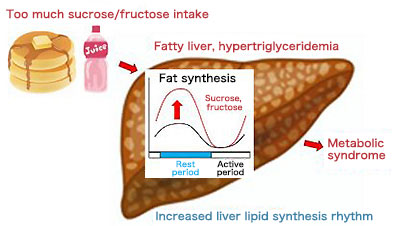News
Nagoya University Unravels Why Too Much Sugar Intake Can Trigger Metabolic Syndrome Updated in November 2019
The mechanism of why excessive intake of sugar or sucrose leads to metabolic syndrome has been revealed by a research group at Nagoya University. The group discovered that too much sugar can disturb the rhythm of lipid metabolism in the liver and can lead to easier accumulation of neutral fat. The research results were published in the U.S.-based Journal of Biochemical Chemistry dated September 3. The results may lead to the prevention of metabolic syndrome.
Metabolic syndrome is not a disease but it is the precursor to lifestyle-related diseases like hypertension and diabetes. When one is diagnosed with metabolic syndrome at a health checkup in Japan, guidance on how to improve one’s lifestyle is given by doctors. Until now, it was believed that overeating and lack of exercise caused the syndrome but recently it has been found that excessive consumption of sugar is one of the main factors. The World Health Organization (WHO) has issued guidelines to reduce daily sugar intake to less than 5% of total energy intake.
Research groups led by Assoc. Prof. Hiroaki Oda at the Graduate School of Bioagricultural Sciences, Nagoya University thoroughly investigated the mechanism of lipid metabolism abnormalities caused by excessive sugar intake, including analysis at the gene level. As a result, it was found that taking too much sugar increases the amplitude of lipid synthesis and accelerates production of fat. There are different rhythms during the resting and active phases of the day for the production of fat. It has also been found that acceleration of fat production is caused by fructose which constitutes sugar.
When lipid synthesis is accelerated, neutral fat can accumulate in the liver and blood. If neutral fat accumulates excessively in the liver, it triggers fatty liver. It has been pointed out that when fatty liver progresses, it would lead to a type of non-alcoholic steatohepatitis (NASH). When it deteriorates further, it may shift into cirrhosis, the late stage of scarred liver.
“Sweets are special attractions which can be consumed even after a full meal. Why too much sugar is responsible for metabolic syndrome has now been clarified and this can help in promoting preventive measures," pointed out Assoc. Prof. Oda’s team.
In August 2018, the research group announced that amount of fat in the liver and blood could be reduced when people took in sugar only during active daytime hours.








